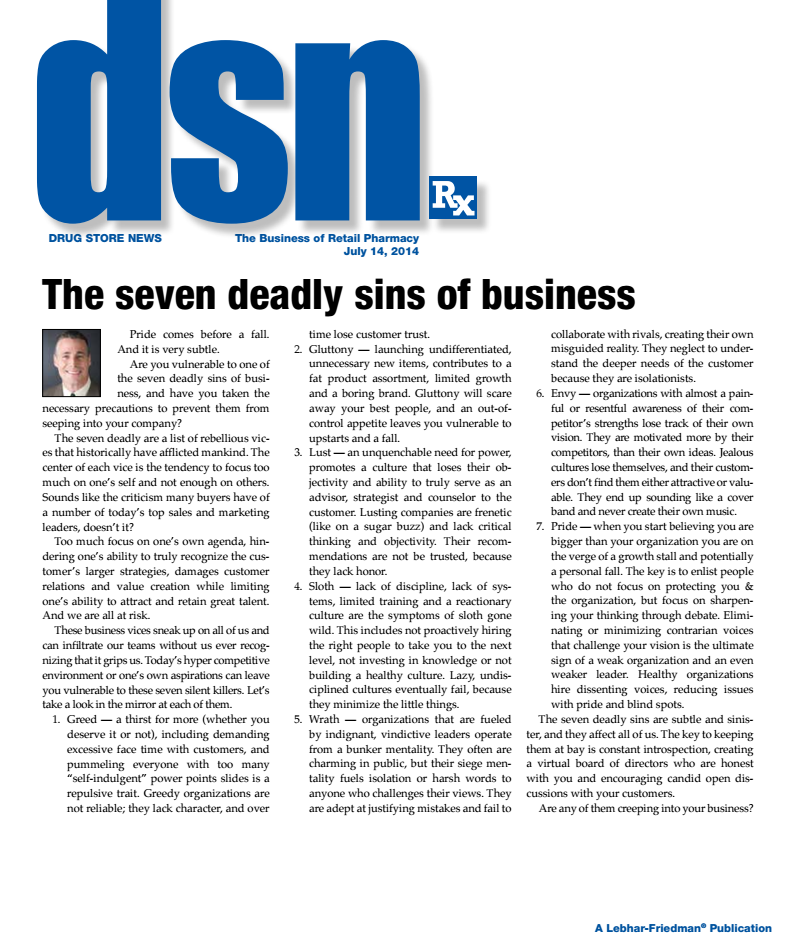Pride comes before a fall. And it is very subtle.
Are you vulnerable to one of the seven deadly sins of business, and have you taken the necessary precautions to prevent them from seeping into your company?
The seven deadly are a list of rebellious vices that historically have afflicted mankind. The center of each vice is the tendency to focus too much on one’s self and not enough on others. Sounds like the criticism many buyers have of a number of today’s top sales and marketing leaders, doesn’t it?
Too much focus on one’s own agenda, hindering one’s ability to truly recognize the customer’s larger strategies, damages customer relations and value creation while limiting one’s ability to attract and retain great talent. And we are all at risk.
These business vices sneak up on all of us and can infiltrate our teams without us ever recognizing that it grips us. Today’s hyper competitive environment or one’s own aspirations can leave you vulnerable to these seven silent killers. Let’s take a look in the mirror at each of them.
- Greed — a thirst for more (whether you deserve it or not), including demanding excessive face time with customers, and pummeling everyone with too many “self-indulgent” power points slides is a repulsive trait. Greedy organizations are not reliable; they lack character, and over time lose customer trust.
- Gluttony — launching undifferentiated, unnecessary new items, contributes to a fat product assortment, limited growth and a boring brand. Gluttony will scare away your best people, and an out-of control appetite leaves you vulnerable to upstarts and a fall.
- Lust — an unquenchable need for power, promotes a culture that loses their objectivity and ability to truly serve as an advisor, strategist and counselor to the customer. Lusting companies are frenetic (like on a sugar buzz) and lack critical thinking and objectivity. Their recommendations are not be trusted, because they lack honor.
- Sloth — lack of discipline, lack of systems, limited training and a reactionary culture are the symptoms of sloth gone wild. This includes not proactively hiring the right people to take you to the next level, not investing in knowledge or not building a healthy culture. Lazy, undisciplined cultures eventually fail, because they minimize the little things.
- Wrath — organizations that are fueled by indignant, vindictive leaders operate from a bunker mentality. They often are charming in public, but their siege mentality fuels isolation or harsh words to anyone who challenges their views. They are adept at justifying mistakes and fail to collaborate with rivals, creating their own misguided reality. They neglect to understand the deeper needs of the customer because they are isolationists.
- Envy — organizations with almost a painful or resentful awareness of their competitor’s strengths lose track of their own vision. They are motivated more by their competitors, than their own ideas. Jealous cultures lose themselves, and their customers don’t find them either attractive or valuable. They end up sounding like a cover band and never create their own music.
- Pride — when you start believing you are bigger than your organization you are on the verge of a growth stall and potentially a personal fall. The key is to enlist people who do not focus on protecting you & the organization, but focus on sharpening your thinking through debate. Eliminating or minimizing contrarian voices that challenge your vision is the ultimate sign of a weak organization and an even weaker leader. Healthy organizations hire dissenting voices, reducing issues with pride and blind spots.
The seven deadly sins are subtle and sinister, and they affect all of us. The key to keeping them at bay is constant introspection, creating a virtual board of directors who are honest with you and encouraging candid open discussions with your customers.
Are any of them creeping into your business?


